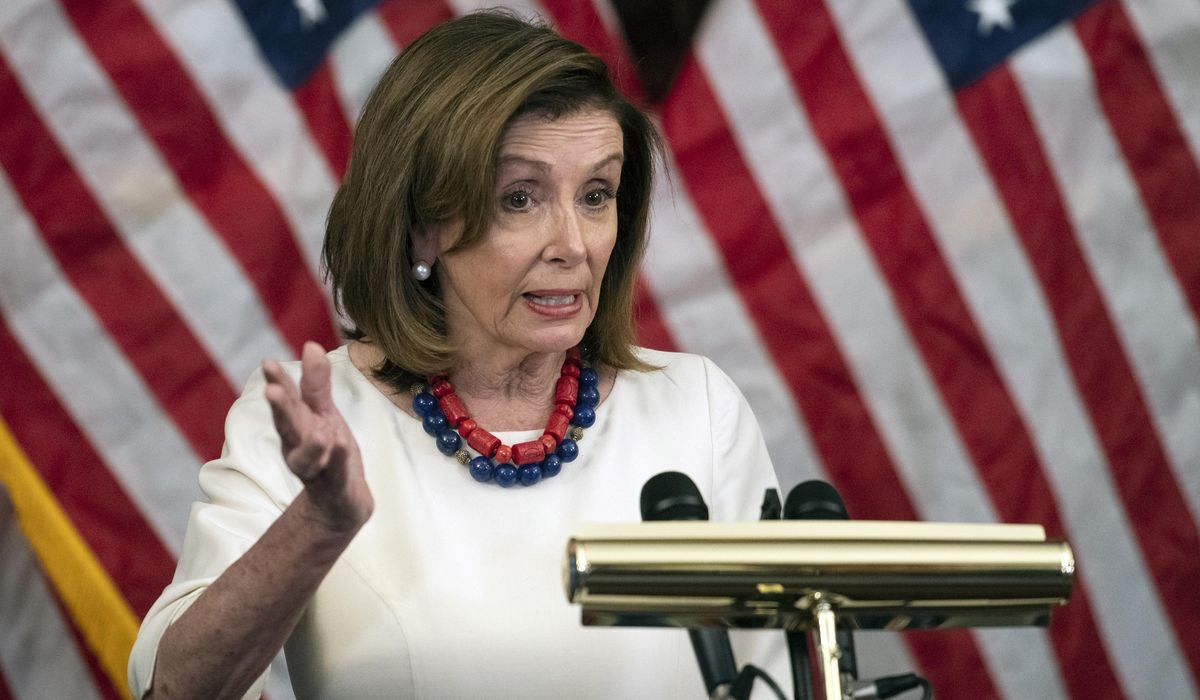
Democrats won’t give up their majority in the House without a fight, and they have a three-pronged strategy to upset what they say is an overconfident Republican Party in this year’s midterm elections.
The plan entails spelling out how their accomplishments are helping voters, casting Republicans as obstructionists obsessed with former President Donald Trump and his stolen election claims, and doubling down on efforts to combat COVID-19 with expectations that the pandemic will yield before voting begins.
President Biden telegraphed a central theme of the party’s message about Republican obstructionism when he repeatedly asked: “What are Republicans for?”
“What are they for?” he said at a rare presidential press conference two weeks ago. “Name me one thing they’re for.”
Mr. Biden and congressional Democrats have grown increasingly frustrated with Republicans over their unflinching opposition to the $1.75 trillion tax and spending plan, undercutting Mr. Biden’s campaign claim that he could break through the partisan gridlock and work across party lines.
While not giving up on passing some “chunks” of the massive spending on social welfare and climate programs, Democrats are prepared to campaign on the $1.9 trillion COVID-19 relief package and the bipartisan $1.2 trillion infrastructure spending enacted last year.
Whatever the case, Democrats are projecting confidence. They say elections are about contrasts, and the contrasts between the two parties are stark.
Party insiders say the message is powerful: Mr. Biden dug the nation out of a mess he inherited from Mr. Trump, who divided the nation and spawned an insurrection against democracy on Jan. 6, 2021, before he exited the White House.
“Year one of House Democrats’ legislative agenda has already delivered vaccines in arms, money in pockets, children in safe schools, a once-in-a-lifetime investment in rebuilding America’s crumbling infrastructure and the single best year of job creation in American history,” said Henry Connelly, a spokesman for House Speaker Nancy Pelosi, California Democrat. “Meanwhile, House Republicans are mired in an increasingly toxic record from getting caught claiming credit for infrastructure investments they voted against, to voting against the American Rescue Plan that kept cops, firefighters and health care workers from losing their jobs in the middle of the pandemic, to spreading the anti-vaccine disinformation that fuels the pandemic.”
Mrs. Pelosi has said she is “very confident” about retaining control of the House in the midterm elections despite Democrats’ razor-thin majority and the historical trend that favors the party that doesn’t hold the White House. Mrs. Pelosi, 81, underscored her confidence last week by announcing her run for reelection.
Mr. Biden and Democrats on Capitol Hill have some bragging rights.
The national unemployment rate sank to 3.9% from 6.4%, and the number of jobs created last year eclipsed 6 million, marking the largest annual increase on record dating back to 1940.
Democrats hope the lingering shadow of Mr. Trump will give them a boost and the House select committee on the Jan. 6 attack on the U.S. Capitol will dig up more dirt on the former president and Republicans who support him.
House Majority Leader Steny H. Hoyer of Maryland said last week that he expects Democrats will pass a slimmed-down version of the massive spending bill known as the Build Back Better Act. He said Democrats will be on much better footing if the COVID-19 crisis starts to “fade” before the election.
“I think we are going to get to a place where the economy is coming back, inflation is going to be coming down, the American people will see the extraordinary legislation that was passed that helped them, their families, their children, their parents and our economy and businesses,” Mr. Hoyer said in a livestream interview with Politico Playbook.
“In that context, which is going to be some months from now, a little less than a year, I think they are going to say, ‘Democrats delivered, Democrats got the job done, Democrats did what they said they would do,’ Mr. Hoyer said. “‘Were they perfect? They were not, but they were good. They were very good, and they did much more for us than the previous Republican Party that was in charge under Trump.’”
During a brief period in the early summer, the Biden administration appeared to be getting COVID-19 under control and Americans were getting back to normal lives.
The moment proved fleeting.
Mr. Biden’s political fortunes turned south after the delta variant of the coronavirus wreaked havoc, yielding more deaths and more frustration from voters with pandemic fatigue.
The chaotic removal of military troops from Afghanistan added to Mr. Biden’s problems.
A Pew Research Center poll released last week found that 41% of voters approve of how Mr. Biden is handling his job. His standing among Democrats also has slipped from September.
Republicans, meanwhile, hold a 3-point edge on the generic ballot, according to the latest Real Clear Politics average of polls.
In the House, 29 Democrats are retiring or seeking other elected offices.
“Republicans hold a massive advantage on the issues that matter most to voters: rebuilding the economy, ending the crime wave and securing the border,” said Michael McAdams, a spokesman for the National Republican Campaign Committee, the campaign arm for House Republicans. “Democrats have a choice this election: retire or lose.”
The latest blow for Democrats was the announcement this week that Rep. Jim Cooper, a 32-year veteran of Congress, would retire after Tennessee Republicans redrew his congressional district.
The picture is a reversal of the 2018 midterm election year.
Reeling from a spate of retirements, Republicans hoped their legislative achievements, particularly the 2017 tax cuts, would resonate with voters and defend their majority.
Mr. Trump helped unify Democrats with his aggressive style of politics and “America First” message.
Still, Democrats hammered home a message about health care and picked up a net 40 seats, winning control of the lower chamber after eight years in the minority.
In 2020, Republicans outperformed expectations and whittled away at Democrats’ majority.
Republicans need a net gain of five seats in the midterm elections to control the chamber.
For more information, visit The Washington Times COVID-19 resource page.








